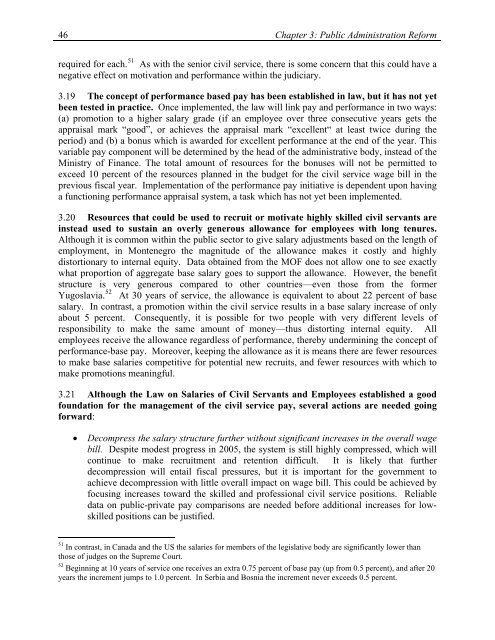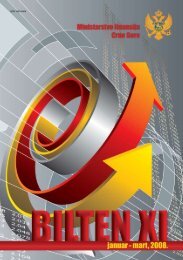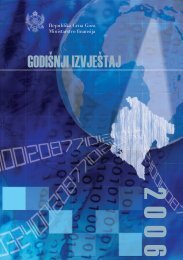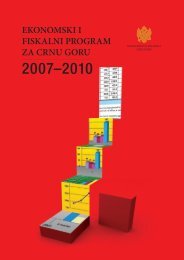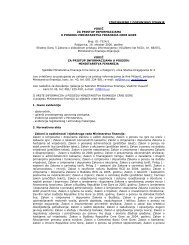Republic of Montenegro: Public Expenditure and ... - Vlada Crne Gore
Republic of Montenegro: Public Expenditure and ... - Vlada Crne Gore
Republic of Montenegro: Public Expenditure and ... - Vlada Crne Gore
You also want an ePaper? Increase the reach of your titles
YUMPU automatically turns print PDFs into web optimized ePapers that Google loves.
46 Chapter 3: <strong>Public</strong> Administration Reform<br />
required for each. 51 As with the senior civil service, there is some concern that this could have a<br />
negative effect on motivation <strong>and</strong> performance within the judiciary.<br />
3.19 The concept <strong>of</strong> performance based pay has been established in law, but it has not yet<br />
been tested in practice. Once implemented, the law will link pay <strong>and</strong> performance in two ways:<br />
(a) promotion to a higher salary grade (if an employee over three consecutive years gets the<br />
appraisal mark “good”, or achieves the appraisal mark “excellent“ at least twice during the<br />
period) <strong>and</strong> (b) a bonus which is awarded for excellent performance at the end <strong>of</strong> the year. This<br />
variable pay component will be determined by the head <strong>of</strong> the administrative body, instead <strong>of</strong> the<br />
Ministry <strong>of</strong> Finance. The total amount <strong>of</strong> resources for the bonuses will not be permitted to<br />
exceed 10 percent <strong>of</strong> the resources planned in the budget for the civil service wage bill in the<br />
previous fiscal year. Implementation <strong>of</strong> the performance pay initiative is dependent upon having<br />
a functioning performance appraisal system, a task which has not yet been implemented.<br />
3.20 Resources that could be used to recruit or motivate highly skilled civil servants are<br />
instead used to sustain an overly generous allowance for employees with long tenures.<br />
Although it is common within the public sector to give salary adjustments based on the length <strong>of</strong><br />
employment, in <strong>Montenegro</strong> the magnitude <strong>of</strong> the allowance makes it costly <strong>and</strong> highly<br />
distortionary to internal equity. Data obtained from the MOF does not allow one to see exactly<br />
what proportion <strong>of</strong> aggregate base salary goes to support the allowance. However, the benefit<br />
structure is very generous compared to other countries—even those from the former<br />
Yugoslavia. 52 At 30 years <strong>of</strong> service, the allowance is equivalent to about 22 percent <strong>of</strong> base<br />
salary. In contrast, a promotion within the civil service results in a base salary increase <strong>of</strong> only<br />
about 5 percent. Consequently, it is possible for two people with very different levels <strong>of</strong><br />
responsibility to make the same amount <strong>of</strong> money—thus distorting internal equity. All<br />
employees receive the allowance regardless <strong>of</strong> performance, thereby undermining the concept <strong>of</strong><br />
performance-base pay. Moreover, keeping the allowance as it is means there are fewer resources<br />
to make base salaries competitive for potential new recruits, <strong>and</strong> fewer resources with which to<br />
make promotions meaningful.<br />
3.21 Although the Law on Salaries <strong>of</strong> Civil Servants <strong>and</strong> Employees established a good<br />
foundation for the management <strong>of</strong> the civil service pay, several actions are needed going<br />
forward:<br />
• Decompress the salary structure further without significant increases in the overall wage<br />
bill. Despite modest progress in 2005, the system is still highly compressed, which will<br />
continue to make recruitment <strong>and</strong> retention difficult. It is likely that further<br />
decompression will entail fiscal pressures, but it is important for the government to<br />
achieve decompression with little overall impact on wage bill. This could be achieved by<br />
focusing increases toward the skilled <strong>and</strong> pr<strong>of</strong>essional civil service positions. Reliable<br />
data on public-private pay comparisons are needed before additional increases for lowskilled<br />
positions can be justified.<br />
51 In contrast, in Canada <strong>and</strong> the US the salaries for members <strong>of</strong> the legislative body are significantly lower than<br />
those <strong>of</strong> judges on the Supreme Court.<br />
52 Beginning at 10 years <strong>of</strong> service one receives an extra 0.75 percent <strong>of</strong> base pay (up from 0.5 percent), <strong>and</strong> after 20<br />
years the increment jumps to 1.0 percent. In Serbia <strong>and</strong> Bosnia the increment never exceeds 0.5 percent.


